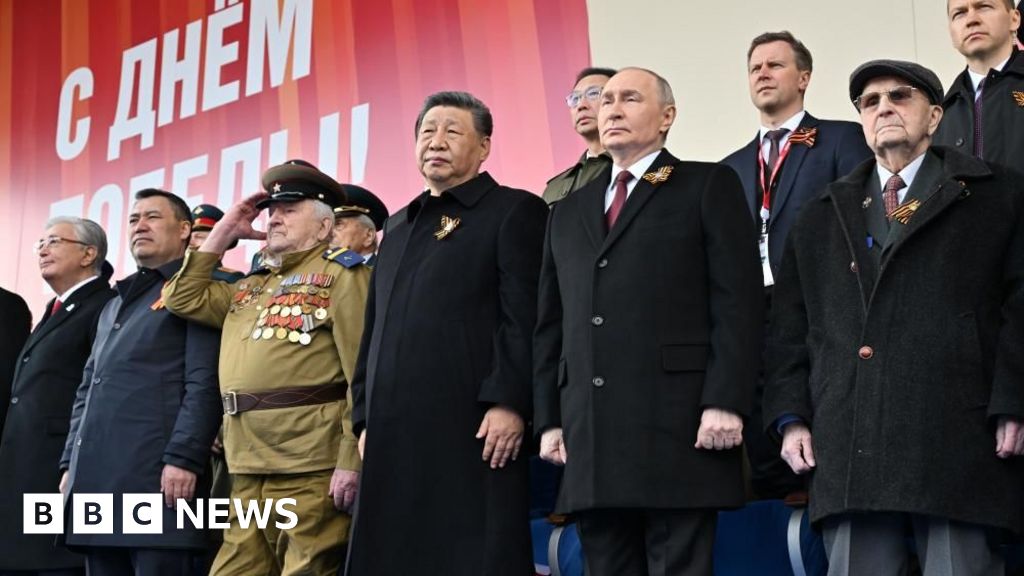China's Xi Jinping Stands in Solidarity with Putin at Russia's Victory Day Parade

In a striking display of unity, Chinese President Xi Jinping stood alongside Russian President Vladimir Putin during the grand Victory Day parade held in Moscow's Red Square. This event, commemorating the 80th anniversary of the Soviet Union’s victory over Nazi Germany, took place amid heightened security and a backdrop of ongoing conflict in Ukraine.
Putin, leading the commemorations, delivered a speech to thousands of soldiers and over 20 international dignitaries, emphasizing the lessons learned from World War II. In a controversial move, he directly linked the historical narrative of the war to the current situation in Ukraine, characterizing Russia’s military actions as a “special military operation” that has now entered its fourth year. The Russian government announced a unilateral three-day ceasefire coinciding with the event, which Ukrainian officials quickly dismissed as a “theatrical show.”
As the ceasefire took effect on May 8, reports from Ukraine's military indicated that they had endured thousands of attacks, with Russia asserting that the ceasefire was being observed despite accusations from Ukraine of numerous violations. The days leading up to the ceasefire were marked by an intensified exchange of strikes between the two nations, leaving many flights across Russia cancelled and approximately 60,000 passengers stranded due to drone attacks originating from Ukraine.
Amid these tensions, heavy security measures were implemented in Moscow. Prior to Putin's address, Major General Oleg Salyukov, commander of Russia's ground forces, led a contingent of 11,000 troops into the Red Square, which included 1,500 soldiers who have actively participated in the conflict in Ukraine. These troops were then inspected by Defence Minister Andrei Belousov. Putin asserted that Russia would remain a steadfast barrier against what he termed “Nazism, Russophobia, and antisemitism,” and maintained his controversial stance of labeling Ukraine's leadership as Nazis.
Putin’s rhetoric included claims that “truth and justice are on our side,” and he insisted on the full support of the Russian populace for the military operations in Ukraine. The parade witnessed the presence of 27 world leaders, with Xi Jinping prominently positioned beside Putin. Xi was adorned with the St. George ribbon, a symbol of military valor that has been banned in several neighboring countries due to its association with Russian nationalism. The parade also featured approximately 102 Chinese troops alongside military units from North Korea, Vietnam, and Mongolia; notably, many North Koreans are believed to have participated in the conflict in Ukraine.
The guest list for the event included several controversial figures, such as Brazilian President Luiz Inácio Lula da Silva and Venezuelan President Nicolas Maduro, as well as Aleksandar Vucic, the Serbian President, who is currently a candidate for EU membership. Slovakia's Prime Minister Robert Fico was the only EU leader present at the parade, despite earlier warnings from EU foreign policy chief Kaja Kallas, who had cautioned that participation from EU members or aspiring states would be inappropriate given Russia's ongoing military aggression.
Putin viewed Xi's attendance at the event as a significant diplomatic victory, expressing admiration for the “courageous people of China” while honoring Russia’s historical allies from World War II. Reports indicated that prior to the parade, both leaders had engaged in two rounds of discussions, as well as a more informal conversation regarding the ongoing conflict in Ukraine. The event concluded with a display of Russia’s military might, showcasing an array of advanced weaponry, including Yars missile systems, tanks, and armored personnel carriers. The parade concluded with a flyover by six Su-25 military jets, marking a powerful end to the commemorative festivities.


















